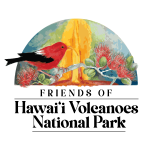Hawaiʻi Volcanoes National Park News Release: March 26, 2021
Hawaii National Park, HAWAI‘I – Hawaiʻi Volcanoes National Park reopened Nāhuku (Thurston Lava Tube) today, March 26, 2021. The popular walk-through lava tube and rainforest trail were closed since March 2020 due to the coronavirus pandemic.
There’s one way to explore Nāhuku (Thurston Lava Tube) again, and that’s on a newly signed one-way trail intended to keep everyone safe. The half-mile loop trail goes counter-clockwise through beautiful native rainforest, into the lava tube and back out through the rainforest.
“We are excited to again share the incredible experience of walking through native rainforest into a lava tube that was formed during a Kīlauea eruption more than 500 years ago,” said Hawaiʻi Volcanoes National Park Superintendent Rhonda Loh. “The one-way flow reduces social distancing conflicts in the cave and on the trail, and we are relying on visitors and our community to recreate responsibly. Please wear a mask when physical distancing cannot be achieved,” Loh said.
Nāhuku is open 24 hours and is lit from 8 a.m. to 8 p.m. Bring a flashlight or head lamp if visiting during dark hours. Restrooms near the lava tube are open from 9 a.m. to 5 p.m. and a new vault toilet is available a ½ mile away at the Kīlauea Iki parking lot.
All lava tubes present potential risks, including rockfall, low ceilings, standing water, tripping hazards and low light. Visit the park website to learn more.
The park closed the lava tube following the 2018 eruption and summit collapse of Kīlauea, reopened it in February 2020, then the pandemic struck and it closed again. During the eruption, large rocks were dislodged in the ceiling and new cracks appeared. A geomorphologist, mining engineer and other specialists determined Nāhuku could be reopened if safety mitigations were met. Two crack monitors were installed, and a low-hanging rock was marked off to prevent head injuries. Data from the monitors reveals little change in the cave’s structural integrity.
Nāhuku was first publicized in 1913 by Lorrin Thurston, a Honolulu publisher and proponent for establishing the national park. Nāhuku means “the protuberances” in Hawaiian, and possibly refers to the lava stalactites that once covered its ceiling but were taken by souvenir collectors. During the recent closures, long, delicate roots from ʻōhiʻa trees that grow on top of the underground tube now reach the floor in some areas. Colonies of white microbial matter thrive on the cave walls. Visitors are urged to protect these resources for future generations by not touching the roots or cave walls.
